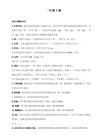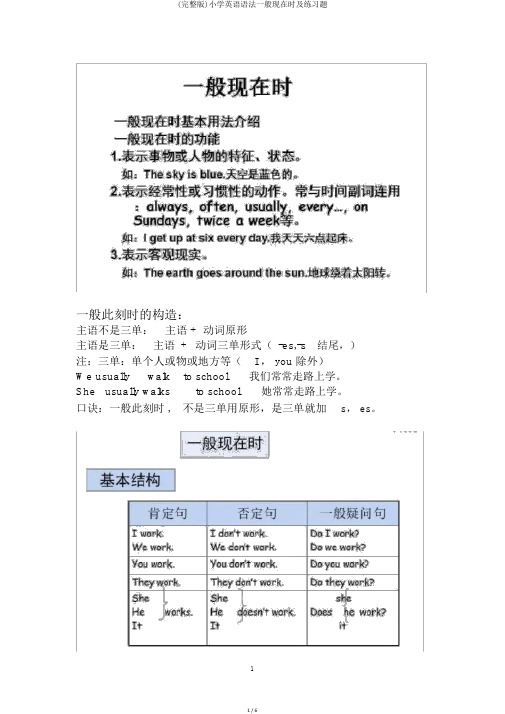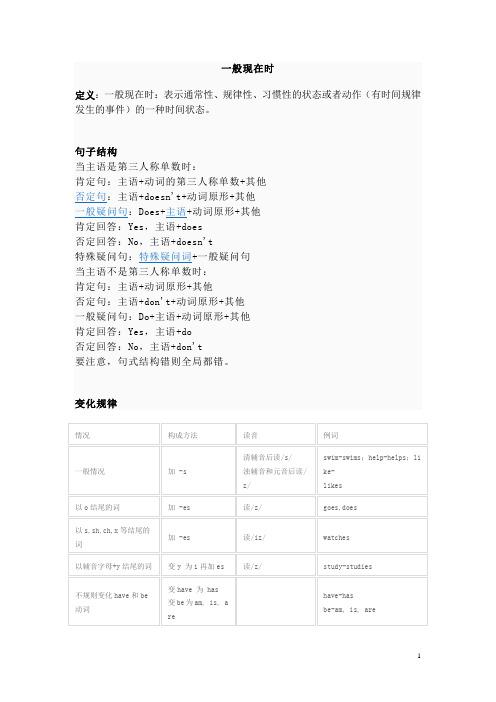(完整版)一般现在时主语三单口诀
英语语法口诀

十五、基数词变序数词[之一) 基变序,有规律, 词尾字母tdd。① 八减t,九减e, f要把ve替。②ty把y变成i, 记住th前有个e。③①按:指first、 second、third。 ②按:指eight去掉t,nine去掉e,five和 twelve去掉ve 加上f。 ⑦按:指twenty→twentieth等。
十六、基数词变序数词(之二) 第一、二、三要全变,① 其余“th”加后边,⑧“th”里有例外, 你需格外记明白: 八减t,九减e,② 字母f代ve,④ty变tie。⑥ ①one——first,two——second,three——third。 ②four-fourth,seven-seventh,hundredhundredth。 ③eight——eighth,nine—ninth。 ④five—fifth,twelve—twelfth。 ⑤twenty—twentieth,sixty——sixtieth。
十七、there be的位置和用法 说明何时何地有, there be在主语前。 随着主语第一个, be的形式做变换。
十八、be going to的用法 be going是助动词, 后跟加to不定式。 说明“准备”或“就要”, 时间人称只变be 。
十九、have +got
have
作为动词“有”, 情态动词have to; have got惯用语, got可有也可无。 若变否定和疑问, 去掉got再加do; 或把have提句首, not加在have后。
十一、动词的时态 四种时间各四式, 联想对比便于记。 时间现在和过去, 各自还有将来时。 一般、完成、进行式, 完成进行是四 式。 四四共有十六种, 看来复杂掌握易; 除去have/be以外, 动词变化有规 律。
初中一般现在时与三单动词的变化规则

一般现在时1.概念:经常、反复发生的动作或行为及现在的某种状况。
2.时间状语:always,usually,often,sometimes,every week(day,year,month…),once a week, on Sundays,3.基本结构:动词原形/第三人称单数形式(如主语为第三人称单数,动词上要改为第三人称单数形式)4.否定形式:am/is/are+not; 谓语动词若为动词,则在其前加don't,如主语为第三人称单数,则用doesn't,同时还原行为动词。
5.一般疑问句:把be动词放于句首;用助动词do提问,如主语为第三人称单数,则用does,同时,还原行为动词。
三单动词的变化规则1.一般情况下,直接加-s如:play—plays, want—wants, work—works, know—knows, help —helps,get—gets2.以s. x. sh. ch. o结尾,加-es如:guess—guesses, fix—fixes, teach—teaches, brush—brushes, go —goes,do—does,watch—watches,catch—catches3.以“辅音字母+y”结尾,变y为i, 再加-es如:study—studies,carry—carries,fly—flies,worry—worries一般现在时用法专练:一、写出下列动词的第三人称单数drink ________ go _______ stay ________ make ________look _________ have_______ pass_______ carry ____come________ watch______ plant_______ fly ________study_______ brush________ do_________ teach_______catch _________ wash_________ like________have______say_________ learn ________ eat________ read_________ sing_______二、用括号内动词的适当形式填空。
英语一般现在时歌谣口诀

一般现在时
一般现在时态中,时间标志常出现。
表述事实讲真理,习惯反复常发生。
动词be有三种,am is 还有are
实义动词用原形,若遇主语为三单,动词词尾加-s(es). 助动词加实义,永远都是用原形。
若变否定陈述句,需看结构是哪种
系(be)表以及there be,be的后面加not。
助动词加实义,助动词后面加not。
实义动词做谓语,动词前面加don’t,
若是三单doesn’t,实义动词就还原。
要变一般疑问句,也看结构是哪种。
系(be)表以及there be,be放句首很好记。
助动词加实义,只需助动词放句首。
实义动词做谓语,do放句首不会错。
若是三单加does,牢记动词要还原,
所有问句请牢记,句尾问号莫忘记。
英语语法记忆口诀

vt又可分三类,单宾双宾最常见,
还有宾语补足语;各种搭配记心间。
before和ago巧记
before带在点之前,ago总在段之后。
before时态不确定,过去时中用ago。
-f或-fe结尾的名词的复数形式
勇敢的妻子(wife)亲自(oneself)拿刀(knife)把狼(wolf)赶走,救回小牛(calf)半(half)条命(life),又把躲在葡萄架(shelf)下树叶(leaf)中的小偷(thief)抓到。
英语语法记忆口诀
一般过去时:
一般现在时态中,动词一般用原形。
表述事实讲真理,习惯动作常发生。
动词词尾加-s(es),只表单数三人称。
若变一般疑问句,得看句型是哪种。
系表结构和there be, be放句首可完成;
若遇实义动词句,do或does莫忘用!
现在进行时
Look, Listen是标志,现在进行正发生;
一些动词要掌握,have, let和make,
此三动词是使役,"注意""观察""听到"see,
还有feel和watch,使用它们要仔细,
后接"宾补"略去"to",此点千万要牢记
除此之外,还可以掌握"八字言",
一感feel,二听hear, listen to,三让have, let, make,四看see, look at, observe, watch
非谓语动词的一些特殊用法后只接不定式作宾语的一些常用特殊谓语动词
动词后,不定式,want, hope和wish,
(完整版)小学英语语法一般现在时及练习题

一般此刻时的构造:主语不是三单:主语 + 动词原形主语是三单:主语+动词三单形式(-es,-s结尾,)注:三单:单个人或物或地方等(I , you 除外)We usually walk to school.我们常常走路上学。
She usually walks to school.她常常走路上学。
口诀:一般此刻时 ,不是三单用原形,是三单就加s, es。
动词三单形式变化规则1)一般状况:加 -swork —works2) 以 s, x, z, sh, ch或o结尾:加-espass —passes, push—pushes,catch —catches, go--goes3)以辅音字母 +y 结尾:改 y 为 i,加 -es (辅音字母是: a,e, i, o, u 之外的字母)fly —flies4)不规则变化have--has口诀:一般此刻时,三单s/es ,其余无变化,详细规则要切记:1)直接加s2)以 s,x ,ch ,sh ,o 结尾 +es 3 )辅 +y,变 y 为 i,+es 4 )特别状况特别记, have 变 has 。
练习题:用所给词的正确形式填空1. We often___________(play) on the playground.2. He _________(get) up at six o ’clock.3.__________you _________(brush) your teeth every morning.4.What____ (do) he usually _____(do) after school?5.Danny _______(study) English, Chinese, Maths, Scienceand Art at school.6. Mike sometimes __________(go) to the park with his sister.7. At eight at night, she ________(watch) TV with his parents.8.________ Mike________(read) English every day?9.Howmany lessons ______your classmate____(have) on Monday?10.What time ____his mother_________(do) the housework?11.He often ______(have) dinner at home.Daniel and Tommy___ (be) in Class One.13.We____ (not watch) TV on Monday.14.Nick _____(not go) to the zoo on Sunday.15.They______ (like) the World Cup?What ____they often ____(do) on Saturdays17.Your parents________ (read) newspapers every day?18.The girl______ (teach) us English on Sundays.19.She and I _______(take) a walk together every evening.20.There_______ (be) some water in the bottle.Mike ______(like) cooking.22.They_______ (have) the same hobby. Myaunt______ (look) after her baby carefully.24.You always____ (do) your homework well.I_____ (be) ill. I’m staying in bed.26.She_____ (go) to school from Monday to Friday.27.Liu Tao _____(do) not like PE.28.The child often______ (watch) TV in the evening.29.Su Hai and Su Yang ______(have) eight lessons this term.30. -What day ______(be) it today?-It’s Saturday.31.Don ’t make a noise. Grandpa __________(sleep).32.Tom ’s family__________(watch) TV.33.It ________(take) me two hours to finish my homework lastnight.34.What ______ your mother _______(do) every evening? She_______(wash) clothes.35._______ it ______ (rain)every day?36.What _______(do) you _______ on Sundays ? We________ (play) football.37.There ________ (be) a football match on TV every morning.38.They often ________ (visit) the Great Wall.39.Who _______ (dance) the best in your class?40.He _____________ (not come).41.The earth __________ (move) round the sun.42 She ________ (buy) a sweater.43. Mr. Wang often______( go) to Shanghai.二、改句子1. Do you often play football after school? (一定回答)2. I have many books.(改为否认句)3. Gao Shan ’s sister likes playing table tennis(改为否认句)4. She lives in a small town near New York.(改为一般疑问句)5. I watch TV every day.(改为一般疑问句)6. David has a goal.(改为一般疑问句)7. We have four lessons.(否认句)8. Nancy doesn ’t run fast(一定句)9. My dog runs fast. (一般疑问句)(把 10—14 小题变否认句,一般疑问句和划线发问)10.Mike has two letters for him.11.I usually play football on Friday afternoon12.Su Yang usually washes some clothes on Saturday.13.Mingming usually waters the flowers every day14. Tom does his homework at home.三、写出以下动词的第三人称单数形式:1.wash_________ match _______guess______ study______ finish_________ go________ snow______ carry_________2.stop______see________drive________let_______carry______ keep_____ join______ find_______ think________ teach______ catch______3.stay_______ begin______ forget_______forget______lie________ die _______ run_______ prefer______ give________ ring_______ dance______ hope_______四、单项选择:1.There _____ an English film at the cinema now.A. will haveB. is going to haveC. is going to beD. is2.The picture _______ nice.A. looksB. is lookedC. lookD. is looking3.She ______ down and soon falls asleep.A. liveB. lainC. laidD. sits4.They _____ the office in time very morning.A. reach toB. arrivedC. wentD. get to5.We shall go to Shanghai on business before you _____back next week.A. will comeB. cameC. would comeD. come6.The plane ______ over there.A. isB. areC.amD. was7.I see her ____ the room this morning.A. to enterB. enteredC. enterD. enters8.The teacher ________us to come to school on time.A. askB. askingC. asksD. asked9.John always ______ others.A. helpB. helpingC. helpsD. to help10.He ______for eight hours every day.A. workingB. to workC. worksD. worked11.You ’d better ______ at home and ______ your homework.A. to stay, doB. stay, doC. to stay, to doD. stay, to do12.He sits down and ______ a rest.A. havingB. haveC. to haveD. has13.Uncle Wang never ______ a cake. A.make B. to make C. making D. makes。
一般现在时动词三单

一般现在时动词三单一般现在时的句子结构1、当句子表状态说明主语是什么或怎么样时句子结构为:主+BE动词,am, is, are,+其他.+BE动词+not+其他. 否定式为:主疑问句为:BE+主+其他,例: The twin sisters are from America.The twin sisters are not from America.Are the twins from America? 2、当谓语由实义动词充当~主语不是第三人称单数时~句子结构为:主语+动词原形+其它.否定式为:主语+don't+动词原形+其它.疑问句为:Do+主语+动词原形+其它,例: We speak Chinese.They don't speak Chinese.Do you speak Chinese? 3、当主语是第三人称单数时:句子结构为主语+动词,词尾加s或es,+其它.否定式为:主语+doesn't+动词原形+其它.疑问句式:Does+主语+动词原形+其它。
动词三单变化方法1. 一般情况下在动词后面加 s。
例如 read---reads, write---writes, like---likes, take---takes, see---sees,say---says, help---helps 等等。
2. 遇到以 -ch, -sh, -s, -x, -o 结尾的动词~加 es。
例如 teaches, washes, guesses, fixes, goes, does 等。
3. 遇到以“辅音字母+y” 结尾的动词~将 y 改为 i 后加 es。
例如 try---tries, study---studies, carry---carries 等。
4. 个别动词有特殊的变化形式:have---has, be---is。
英语动词第三人称单数形式的变化规则

英语动词第三人称单数变化规则一般现在时的肯定句中,主语为第三人称单数的动词变化主要体现在词尾的变化上,其规律为:1、变否定句:含有动词第三人称单数形式的句子变否定句时,要在动词前面加上doesn’t 或does not,动词的第三人称单数形式要还原成原形:格式为doesn’t/does not + 动词原形,如:He goes to school at six in the morning。
(变否定句)→He doesn't go to school at six in the morning.2、变一般疑问句:把含有动词第三人称单数形式的变成一般疑问句时,要借用助动词does,如:She goes home at five every day.→Does she go home at five every day?--- Yes, she does./No, she doesn’t。
3、对划线部分进行提问(变特殊疑问句):一般格式为Whxxx + 一般疑问句?She goes home at five every day。
(对划线部分提问)→When/What time does she go home every day?She goes home at five every day. (对划线部分提问)→Who goes home at five every day?She goes home at five every day。
(对划线部分提问)→What does she do at five every day?哪些主语是第三人称单数?1、人称代词he,she, it;如:He likes watching TV. 他喜欢看电视。
She has lunch at twelve. 她十二点吃午餐。
It looks like a cat。
它看起来像只猫。
2、单个人名、地名或称呼作主语;是第三人称单数。
(完整版)一般现在时的语法总结

一般现在时定义:一般现在时:表示通常性、规律性、习惯性的状态或者动作(有时间规律发生的事件)的一种时间状态。
句子结构当主语是第三人称单数时:肯定句:主语+动词的第三人称单数+其他否定句:主语+doesn't+动词原形+其他一般疑问句:Does+主语+动词原形+其他肯定回答:Yes,主语+does否定回答:No,主语+doesn't特殊疑问句:特殊疑问词+一般疑问句当主语不是第三人称单数时:肯定句:主语+动词原形+其他否定句:主语+don't+动词原形+其他一般疑问句:Do+主语+动词原形+其他肯定回答:Yes,主语+do否定回答:No,主语+don't要注意,句式结构错则全局都错。
变化规律具体运用1.表示经常的或习惯性的动作,常与表示频率的时间状语连用。
时间状语: always, usually,regularly,everymorning/night/evening/day/week/year,often,sometimes,occasionally ,from time to time,twice a week,rarely,seldom,once a month, hardly, ever,never.e.g. I leave home for school at 7:00 every morning.2.表示主语具备的性格、能力、特征和状态。
e.g. I don't want so much.Ann Wang writes good English but does not speak well.比较:Now I put the sugar in the cup.I am doing my homework now.3.表示客观事实和普遍真理。
e.g The earth moves around the sun.Shanghai lies in the east of China.4.在时间状语从句和条件状语从句中,常用一般现在时代替将来时。
- 1、下载文档前请自行甄别文档内容的完整性,平台不提供额外的编辑、内容补充、找答案等附加服务。
- 2、"仅部分预览"的文档,不可在线预览部分如存在完整性等问题,可反馈申请退款(可完整预览的文档不适用该条件!)。
- 3、如文档侵犯您的权益,请联系客服反馈,我们会尽快为您处理(人工客服工作时间:9:00-18:30)。
解题攻略——关于一般现在时的主语三单形式
在英语考试中,主语是第三人称单数(简称三单)的一般现在时是必考内容。
经常以选择和填空的形式出题。
我们该怎么把题做对呢?
请按以下步骤来审题:
①首先寻找表示时态的标志性词语,判断句子的时态。
②如果时态是一般现在时,去看句子开头的主语是不是第三人称单数。
③什么样的主语是第三人称单数?记住下面的口诀
口诀如下:
1.he、she、it 和人名,
2.谁的亲戚,谁的爸妈
3.this 、that、the、a、an,
4.出现在单数前是三单
5.地名、国名当排头
6.一定是三单别放松
7.不可数名词当主语
8.也是三单别放过
9.以上情况一出现
10.动词原形变变变
注解:
1. He、she、it 和人名
解释:男他、女她、指物的它以及具体的人名如:Tom, Amy,Sam等
例句:He like s watching TV.他喜欢看电视。
She has lunch at twelve.她十二点吃午餐。
It look s like a cat.它看起来像只猫。
2.谁的亲戚谁的爸妈
解释:例如Tom’s uncle, Amy’s aunt, Lingling’s sister , my father, my mum 等等
例句:Tom look s like her mother. 汤姆看起来像她的母亲。
Amy’s aunt 或Uncle Wang often make s cakes.王叔叔经常做蛋糕。
My sister like s dancing . 我的姐姐(妹妹)喜欢跳舞。
3/4/ This 、that、the 、a、an,出现在单数前是三单
解释:例如this book, that cat , a horse, an orange 等this/that /the /a/an 后面加上单数可数名词作主语,都属于第三人称单数。
be动词要用is.
例句:This i s a pen.这是一支钢笔。
That is an eraser.那是一块橡皮擦。
A horse is a useful animal.马是有用的动物。
This book is yours.这本书是你的。
That car is red.那辆小汽车是红色的。
The cat is Lucy's.这只猫是露茜的。
5/6 地名、国名当排头,一定是三单别放松
解释:例如Beijing,China等地名、国名当主语是,也属于第三人称单数。
例句:Beijing is in China.北京在中国。
China is in Asia 中国在亚洲
7/8 不可数名词当主语,也是三单别放过
解释:像milk , water, juice bread等不可数名词作主语时,也属于第三人称单数
例句:①The milk is i n the glass. 牛奶在玻璃杯里
②The bread is very small. 这面包很小。
9/10 以上情况一出现, 动词原形变变变
解释:只要出现上面所列举的主语形式,动词原形需要根据变化规则在原形后面加s/es 或去y变i加es,如果是be动词则要用is.。
